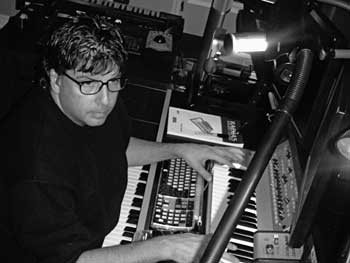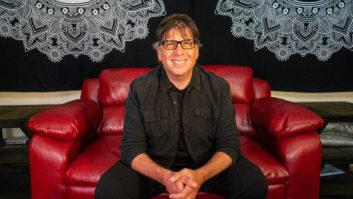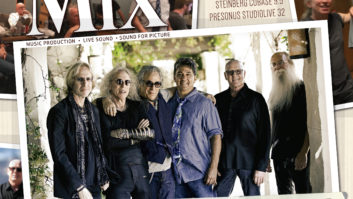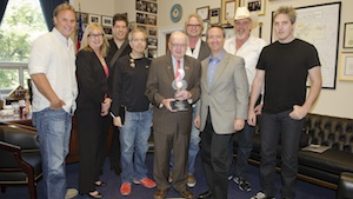
For this year’s Grammy-nominated Producer of the Year Howard Benson, this acknowledgement has been a long time coming. Since 1989, Benson has been acquiring a long list of impressive production credits, including My Chemical Romance, All American Rejects, Hoobastank, Papa Roach, Flyleaf, Three Days Grace, last year’s American Idol finalist Chris Daughtry, Blindside, Cold, P.O.D., TSOL and Motorhead, to name just a few.
For the Grammy, he is nominated for his work on Hoobastank’s Every Man for Himself, Flyleaf’s self-titled, Less Than Jake’s In With the Out Crowd, Three Days Grace’s One-X, Papa Roach’s The Paramour Sessions, Head Automatica’s Propaganda and Saosin’s self-titled.
Mix caught up with the ever-evolving producer to talk about this year’s nominated projects and what’s in the works.
How did you start off?
I have a degree in materials engineering from Drexel University. When I was in school, I was playing in a band every night. So I had two brains going on at the same time for a long time. One year, I took off school and I went to Philadelphia College for Performing Arts and I studied composition, but I still got my engineering degree. I worked out here [L.A. area] for Garrett AiResearch; I worked on C-5s and F-18s. At the same time, I was driving to Hollywood every night playing in a horrible band, but we got a producer to produce us, and when we went into the studio with this producer, I realized right then that that’s the gig for me.
I realized the only guy earning a living in the whole business that I could see was the producer. And not only that, if you had a technical background like I had, how hard could it be to record? I immediately picked it all up, and then with the musical background, I started thinking, “This is great. All I have to do is work with these guys for two months and they’re out of my hair.” That’s how I started making records, and I got my first band, TSOL, which probably couldn’t have been a better band to produce; an absolutely crazy punk band on drugs—everything I read about was right in front of me and I had to make a record with them. It was absolute chaos, but I got it done.
And then a few years later, I worked with Lemmy [Kilminster] from Motorhead, which is probably where I learned how to handle a star. It was like if Einstein said, “This is what chaos is,” you could point to Lemmy and Lemmy could be a physics problem. I ended up in the hospital one day because I was so exhausted: He wouldn’t sleep, he wouldn’t stop working, he constantly fought with me. I made four, five records with him and these records don’t sell very much, but it’s as pure as you can get: He doesn’t care about selling records, he just goes in there, puts on the bass, he has two Marshall stacks—one’s called Murder, the other’s called Killer—he turns them up as loud as you can—you have to put earmuffs on—and he rocks out. And when you watch him rock out, you think, “That’s the bar. Everyone else has to play as good as that or they just suck.” He can sing great; he came up with harmonies off the top of his head. Unbelievably talented guy, very smart.
You’ve worked with Hoobastank previously, right?
I did Hoobastank’s previous album, The Reason, and that was a huge record, so I naturally did their second album; actually, it was their third album, my second with them. And they came to me originally before The Reason and I think that they had realized that I was one of the producers who could take bands from having a smaller sales base to Platinum—I’ve done that with a lot of bands. I think they wanted to step it up, and they wanted to have a better-sounding album and more arrangement help—stuff that a lot of bands come to me for, which is just to up the game. I assume I’m being hired to go Platinum with everything.
It’s funny. I was on a panel with producers at SXSW last year and out of five of us, I was the only one who stepped out and said, “Hey, when I do a record, I’m assuming I’m going to go Platinum and that’s what I’m doing it for.” And the other producers were like, “Well, that’s here say. We’re just artists and screw the record companies and we’re just doing this for art’s sake and sales are not that important.” And I was thinking, “I don’t know who you’re producing for, but I’m getting hired to make hits.”
So when I met Hoobastank, I said, “Hey, guys, let’s try to really go for it here.”
Did you have any specific recording techniques with the band this time around?
Well, it’s pretty much the same for everybody. We approach every band the same way as far as the process, but every band inside the process gets treated differently. We have a way of tracking and overdubbing, and we usually do things in what I call a parallel system: We don’t do one thing at a time. When we’re doing our guitars and bass, a lot of the time we’re recording vocals in another room at the same time. We constantly keep everybody working. So the songs are coming together all at once. I like that [process] because you can hear the finished product [as you’re recording].
And what happens after all the recording’s done, I bring everything back to my home studio, Sparky Dark Studios, and that’s where I do a lot of the magical stuff. I do the arrangements and rearrange stuff and add harmonies and I add my own keyboard parts—all the stuff that makes my records sound like my records.
I think a lot of stuff [in my home studio] that makes it special is more about the plug-ins. I use a lot of virtual keyboards; I’ve just gotten into the Korg Radius—that’s a great keyboard—and I’ve just gotten myself a Moog Voyager and I’m using the Nord Electromechanical. I also have a whole bunch of old keyboards and Hammonds, plus I have a huge virtual collection. I use the IK Multimedia Miraslov Orchestra. I think the plug-ins are a large part of my sound because I end up emphasizing the guitar parts with keyboards behind them; I mirror a lot of the parts that are being played. I double the bass, I add extra harmony parts, I move hooks around. A lot of times, I’ll create a song out of just an editing process that becomes a hit just by editing lyrics in different places. I had a hit song by Cold called “Stupid Girl” where I literally moved “stupid girls” from the verses to the choruses, and we had a hit with it.
How would you define your role as a producer?
I’m very involved with the vocals—the lyrics, melodies and the arrangements—and I’m not as involved in recording guitar and bass, but I oversee all of the arrangements and parts. You’re recording guitar chords across a three-minute song that can take a day-and-a-half to do because of timing issues, finding the right sound, finding the right amp, finding the right microphone. As a producer, you don’t want to lose the forest from the trees. And I have two or three of the greatest guys working for me. My team of four guys—of which two of them do the guitar stuff—that’s their thing and they’re really into guitars. They’re into the minutia of that world. I really appreciate all of that, but personally that’s not going to make a hit record. I have to focus on the songs and what they mean. To me, the whole thing is about the lyrics, and if you have lyrics that suck, the song sucks.
When I did the All-American Rejects for example, that song “Move Along,” which was a really big hit, a lot of the lyrics when it came to me were not the lyrics. And I would suggest things to [the band]. The same thing with Hoobastank with The Reason. I just go into every song like that. A lot of times I don’t have to do anything, but a lot of times I do—adding harmonies, counterpoint parts.
I’m not the kind of person who is not involved.

Howard Benson (left) and engineer Mike Plotkinoff
My main engineer is Mike Plotkinoff. The reason why I hired Mike was because he was one of the last guys from Little Mountain that remained from that whole crew: starting with Bruce Fairburn, on to Bob Rock, to Randy Staub to Mike Frasier—that whole crew that came out of there, who are all great producers and mixers and people who really re-invented rock ’n’ roll. Plotnikoff was Bruce Fairburn’s longtime engineer. My manager turned me on to him and as soon as I heard he was from Little Mountain, I thought, “This is a guy that I’m going to have work for me,” because I know he knows how to record. I know how hard they were on people up there. He just understands the front end of recording, pre-Pro Tools, and that’s what really matters still, as much as the computer has changed my life, it hasn’t changed his life because for him, it’s all about how to record things. That is still an art.
My Pro Tools engineer, and he plays keyboards is, Paul Decarli. Guitar tech, who used to be Dave Navarro’s guy, is Mark Van Gool. This guy if you say to him, “Can you build me an amp?” He’ll build it on the spot. He’ll grab stuff, throw it together and build you an amp. He’s crazy. He lives guitars. He sleeps with a Stratocaster. My second engineer is Hatch. He has a really long Japanese name, but all I know him is as Hatch.
With Hoobastank, did you work at Bay 7.
That was the main studio; that was where we did just about everything. I’ve been there since 2000, and the first record I did there was POD’s Satellite, which was a triple-Platinum album and I got used to it after that. When you walk into that studio, it’s a lot like walking into a very old ‘70s studio. It’s not sterile; it’s very worn. And a lot of artists love it because they want to be in that environment; they don’t want it to be sterile. It’s a great vibe.
When we first started, we were doing stuff in one room, and then I added another room, then another room, then another room. So we basically kicked the owners out of the studio and they had to get a trailer in the parking lot where they could keep their offices. We put a vocal booth up in the attic with no camera, so I have no idea what the singers are doing up there. I just communicate with them through a mic. The singers love it because they’re very isolated and they can do whatever they want—they do a lot of crazy things up there.
Let’s talk about the other albums for which you are nominated. It seems that you’re attracted to working on hard-rock projects.
To be honest with you, if you look at my entire resume as opposed to the stuff I just did this year, I did My Chemical Romance, which is a very iconic rock band and I’ve done The Reason, which is a very pop album and I also have a record out with Chris Daltry, the American Idol. I’m all over the place and the reason I am is not by accident. I definitely, along with my management, think about what records we want to do and what have we not done; we try to do things we haven’t done before. I don’t want to be stagnant; I want to move around a lot. I learned a big lesson from watching the ’80s and ‘90s, the producers and what I consider a great producer—Tom Warman and Michael Wagener and guys like that—who as soon as the hair bands went away, they went away. And I remember watching that, thinking, “You know, these guys are all really talented but they made a fundamental mistake: They never varied from what they were doing.” I’m not going to do that, so I consciously will go from a My Chemical Romance to a Hoobastank—you couldn’t pick more different bands. Or I’ll go from Saison, which is a hardcore band, to Chris Daltry.
Besides genre-hopping, are there other attractions to a certain project?
What really drives [my attraction to a project] is when I meet somebody that I believe is a star and I love meeting somebody who is brand-new, who nobody has ever heard of, and I say, “That guy’s a star.” And then you just have to produce him. That’s really what you look for in your whole career, and you find it maybe three or four times, but you don’t find it that often.
A lot of times, I produce a band that I think, “They may not be stars, but the songwriting is so good that I want to be involved with them.” I may not want to produce something, but there’s a lot of people who want me to produce it, so they end up giving me enough information that after a while, I think, “You know what, you’re right. I missed it. I may not have been right in my initial feelings.”
Are there any stand-out projects you’ve worked on in the past year?
Flyleaf, because first of all, it’s a female singer [Lacey Mosley], which I haven’t done a whole lot of and I was really happy working with her. When the label called me about her, they said, “We’ve got this band and it’s a very young band. Nobody knows who they are. Would you like to talk to her on the phone?” When I got on the phone with her, it was funny because I don’t think they even knew what a producer was. When I talked to them, it was like two people from different planets talking to each other. Somehow, we communicated on some level where we decided to work together, and their record just went Gold. It’s been a labor of love for not only me, but for the record company [Octone Records] who worked their tails off to get this record Gold. It’s fun to watch something like that where you know everybody believes in it and you’re the person who created the music. So I’m very happy about that.
There’s a band called Saosin that I produced that is doing really well right now. We came out with 38,000 the first week, which looks good, and the sales have been going up. And that’s a band that I basically had to help get through their own personal crisis. They were fighting with each other and I had to come in and become the mediator and then also help with the songs. So there was a lot of work on that one, and it came out and the label believed in it and now we’re almost over 200,000 albums. For a baby band, that’s really good for a single because you know that you’re going to get a shot at a ballad.
I’m really proud of the Chris Daltry album just because of how fast we had to make that album. We made the whole album in five weeks and we had to get it out on Thanksgiving Day, and we got it out. We did everything right. And our first week was 300,000 sales and—boom—we hit Platinum in five weeks. And it’s unbelievable how fast this thing is selling, but a lot of it was because we were very methodical about how we went about it. Clive Davis was the top guy on that one, but I had a good A&R guy. That’s a dream gig as a producer: When everybody is on the same page. But when you’re not on the same page, you also enjoy those because you fought through it and you were still able to make the record happen.
The projects I don’t like are the boring ones. The ones where you walk out and think, “Did I make a record? I don’t even remember that record.” Those projects take a lot out of you because you’re trying to find something to make it work.
How does it feel to be nominated?
To tell you the truth, I never thought it would happen because it’s so hard to get nominated. There’s so many people out there, and as a rock producer, you’re sort of overlooked a lot of the times. I think the reason I got nominated was because a lot of my music has crossed over to pop. When I crossed over to pop, I started to get more and more people noticing my records. It’s funny because last year I had unbelievable sales; this year was good, but not as good. I think when you get nominated, it’s a cumulative thing.
When I got the call, I broke into tears and my wife and I had a nice little cry for about five minutes because we’ve been married for almost 20 years and she’s seen it all: lowest of the lows, the time when you’re holding your kid in your arms and you think, “Geez, am I going to have to get my real estate license?” Nobody sees any of that, but you’re still in it and you survived it.
I appreciate it more than anyone will ever know.

What are your thoughts on mentoring the next generation?
I think for people to get knowledge and I think it’s really important that as a record producer, or anything in this business, that you can impart knowledge on younger people so they can take it forward. And it’s really important to do that because I know that I wouldn’t be where I’m at without Keith Olsen—the “Great Keith Olsen” to me—who produced such great records in the ’80s and ’90s. He took me under his wing and imparted some serious knowledge on to me, and that was during the lowest part of my career because I had just been thrown off a record and he was brought in—that was a long time ago—and he kept me around. And I learned how to do vocals and arrangements; more than anything, I learned how to handle myself in the studio. And I was very young at the time—it may have been 1989—and I watched him be “the man.” And I realized that I was being too friendly with the band: too buddy-buddy, hanging out with them, taking their suggestions—which you have to do, but you’re still “the man.”
He had the intimidation room where he would bring the band in and sit them down where there were Platinum records wall-to-wall, and he would just say, “What do I know?” And you’re thinking, “Yeah, what do you know? A bunch of Platinum records later, you know something!”
I’m doing a band now called Mae. I want, with them and all my artists, pass down some of the things I learned so they can become better and pass down some things to the artists they work with. It’s all about learning your craft. As much as this job is creative, it’s still about knowledge and details.
I try to bring up guys in the studio; we try to hire assistants who want to work—give them the ability to work their way up. And if they don’t, they’re gone. And not many do. The recording schools are horrible; I don’t know what they’re teaching these kids. They certainly don’t teach them how to behave in the studio or what to do. I still think you have to be in there and you have to produce a band—as simple as that sounds, as much as you’ve gone to school, you still have to be responsible for the budget, take it to the studio, produce it and come out with a product. People just can’t do that.
What are you working on now?
I’m finishing this band Mae for Capitol and I just started a band called Meriwether and that’s for Jordan Shur’s label over at Interscope: Suretone Records. Then I start the Starting Line for Virgin and then I’m doing Seether after that. I’m also doing Paul Freeman’s record for Steve Ferrera over at Sony BMG.
I have a lot going on, but I always do. The way I look at it, the less I have going on, the worse the records get. It’s just the way I am. I like to have influences, I like to be able to work on something that is pop-y and then walk into a hardcore session. You just naturally bring the mentality of those other things into a session and you cross them all together and you come up with something different. I don’t want to be a one-trick pony.
Sarah Benzuly is Mix’s managing editor.





